Version 0.5 Dev Preview #6: Pseudo-West Marches
In today's stream, I tackled a bunch of overlapping concepts at once: A GMless/GM-light system; Players having multiple PCs; and taking inspiration from West Marches style games for Voyager.
GM-Light
As mentioned before, part of my goals with Voyager was to remove as many obstacles between a GM and running a game as possible. Part of this involved delegating the expected GM roles between the players (GM-less) as a core part of play, or as a highly recommended way to play (GM-light).
This involves having three roles: Players who controlled the PCs, Players who curated the adventure and setting for that session, and Players who conducted combat and controlled foes. These roles can overlap and be done by multiple players, except for the last case, where the combat conductor would not control any PCs in the interest of fair combat.
In the end, I may indeed go with a default GM format, but make it so there these roles are readily able to be delegated should the GM feel suitable. Regardless, any step taken to dismantle the default notion that "the GM is responsible for everything" is a helpful one for encouraging aspiring GMs (and me) to run their own games.
Multiple PCs
I also talked about the idea of playing multiple PCs in Voyager, in the spirit of hero collecting and tactical recruitment games like Fire: Emblem, Valkyria Chronicles and X-COM.
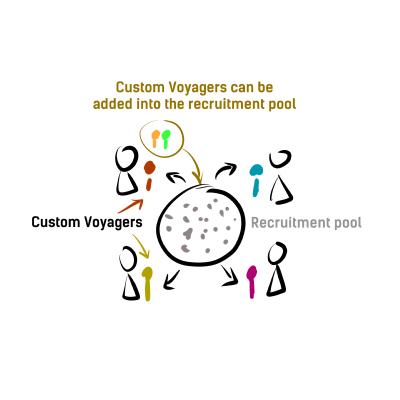
The current idea is that each Player would control their own "Main PC" - this would be their own fully custom Voyager. This is the sole PC they would have full agency over and would play like a traditional PC.
To build up their party or take on different adventures, there would also be a Recruitment Pool: a collection of pregenerated characters called Recruits that the Players can also play as. This would also be a good quickstart option for beginner players who want to just pick anyone and play right away.
And then, for the more homebrew-inclined or those who have a backlog of character ideas, they can make more custom characters and add them into the Recruitment Pool. These are PCs that the players are less attached to, who they can add for other players to freely recruit.
Skill Inheritance
Instead of gaining EXP and spending it on abilities, I was considering to instead recontextualising Voyager advancement as a Mentorship/Inheritance system. Many of the preset Voyager Recruits that your team encounters are veterans or pioneers who have their own unique set of abilities. If your own custom Voyager wanted to learn that ability, they could spend time journeying alongside that Recruit and training with them during Downtime, eventually allowing the Voyager to learn that Recruit's ability.
This too is to further drive home the kind of investment I wanted to capture that I've seen in hero collecting games and RPGs, where "SSR" or "Five-Star" characters may join your party who are big-shots in the world, and who can become mentors and guardians for your own humble Voyager.
Pseudo-West Marches
One concept I really liked while planning Voyager is implementing ideas from the concept of West Marches - a game format where multiple players and GMs all play within a shared campaign setting and arrange their games as if it was one giant "server" of sorts. I wanted to implement parts of these elements into Voyager's game structure, such that even smaller home groups could emulate that sort of feel in their own games. This had to start with an engaging map and ways to interact with it, called Points of Interest (POI).
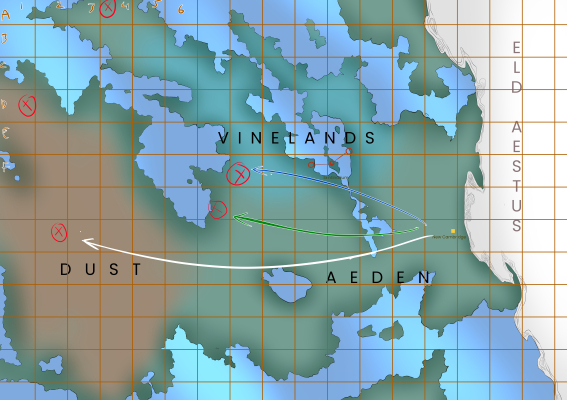
For exploring within the Known World, players would use the campaign map. This map would be divided into a large grid, presumably a 20x10 grid. Whenever a player or the GM wants to add a new POI onto the map, they would roll a d10 (representing rows A to J) and a d20 (representing columns 1 to 20) and plant the POI at the spot on the map, representing a potential adventure.
Players would then mobilise from HQ and send out their team to investigate a POI. However, given that POIs are so far apart (and likely some would be time-sensitive), no single Voyage party is able to tackle them all at once - hence the need to field multiple teams and recruit them. The players could play their main Voyage party on a main mission on one session, while playing as a second team of Recruits off to explore another POI at the same time, on the other side of the map.
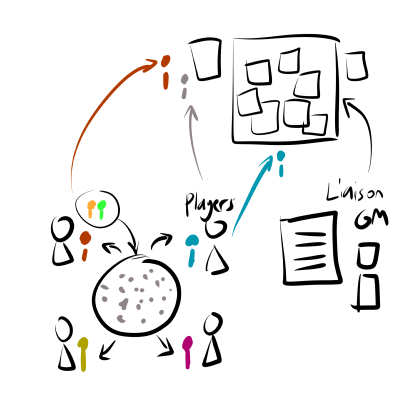
To track and add new POIs, the Liaison (GM) would put up a "mission board" with various simple prompts - "dragon sighted here" or "new ruin discovered here" - just enough information to plant the seed for an adventure. The intent is to minimise planning on the GMs and allow most of the story to emerge from the adventure itself. Voyagers (PCs, not the Players) after their sessions would also be able to plant these prompts in the form of rumours that they may have heard during their Voyage, leaving them for another team of Voyagers to pick up.
This plants investment into certain PCs, even pregen ones, because some of them may have key prompts and goals they would be more interested in. For example, one of the player's Recruits may be a Shardlander who loves studying dragons, and would immediately jump on any dragon-related rumours that pop up on the mission board.
And for the homebrewers, GMs using original settings and ideas can set their adventures far beyond the confines of the Known World, framing their campaigns as "Survey and Expedition" missions into wholly unknown lands that players can recruit Voyagers for.
I always loved the idea of players engaging with Voyager as if it was a persistent world - a home group of 5 in Australia would be exploring the same world as a large game group of 10+ players in Los Angeles and sharing their findings together, connected together by their Voyagers who - in-universe - were all exploring it at the same time. That was what I found super appealing about the West Marches idea, and it really plays into Voyager's intended themes of exploration and cooperation.
I also had the idea of Events, where expansions and new adventures for the system would be framed as actual, in-universe events and discoveries that groups can set their campaigns in and explore at the same time whenever a new one releases, to really impress the feeling that the players are participating in a living world. But that's still a far-off (though nonetheless exciting) consideration.
Relics & Blessings
If you know me, you'd also know I'm no small fan of roguelikes/roguelites, and I'm looking into implementing some of these aspects into Voyager for playtesting.
I briefly touched on a new concept called Relics, basically magic items that you can bring and collect on your adventures, but which disappear after the Voyage ended. These were Simulacra, magical copies of artifacts that granted your party unusual buffs and effects, making each Voyage feel unique. Each Simulacra comes from a different region/faction and helps a lot to sell the flavour and vibe of certain factions your Voyager belongs to.
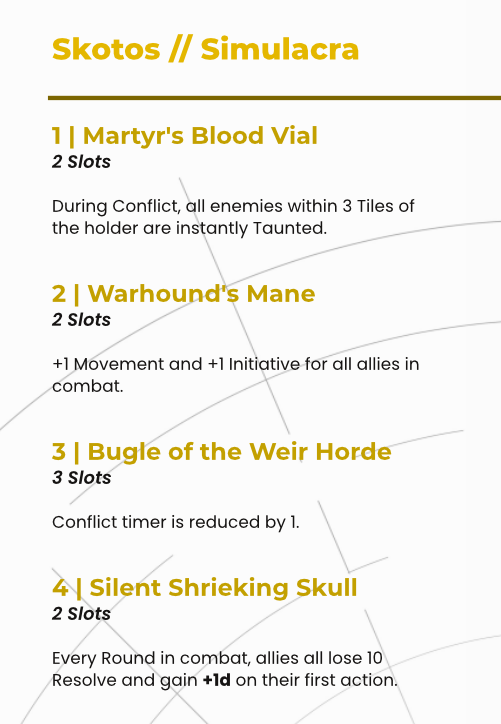
In addition to this, I'm workshopping a Blessings system - mythical manifestations of the Dreaming that bless your adventures, a la the God Boons from Hades. Think of it like how travelers and sailors in ancient times used to pray or offer tribute to Poseidon or another relevant deity to bless their journeys - which is very flavourful for a team of Voyagers preparing to head out into the unknown. While they can be treated as a sort of religion or pantheon, they're more like embodiments of concepts and ideas given tangible power through the World Tree's strange magic.
These Blessings would sort of take the place of stat progression in Version 0.5 - given the larger quantity of PCs and that I wanted to prevent stat bloat and bookkeeping for players, Blessings would likely be your main means of gaining temporary stat boosts, which then reset after each adventure. For example, offering tribute to gain a Blessing of life and healing would increase your party's maximum Resolve, and restore their Resolve at the end of every combat encounter.
This is meant to play even further into Voyager's scenario-based gameplay, as I want to really emphasise through the system that it's less focused on longform narrative play, and is more geared towards making sure each oneshot or adventure you played was as unique as fun as experience as possible, which then encouraged you to return to play next week.
Hopefully, with the overlap of these numerous concepts, I can meld all of them together into a cohesive idea that strongly evokes the themes and game fantasy that Voyager hopes to embody for its players.
Get VOYAGER | Version 0.831 Playtest
VOYAGER | Version 0.831 Playtest
Post-apocalypse hopepunk, science fantasy, badass anime girls.
| Status | In development |
| Category | Physical game |
| Author | Switchback Worlds |
| Tags | Anime, Dice, Exploration, Fantasy, Post-apocalyptic, Tabletop, Tactical RPG |
More posts
- Voyager Twitter account!82 days ago
- Version 0.831 Ability Card Tweaks90 days ago
- Version 0.831: Looking Better Than Ever!96 days ago
- 0.83 Quickfixes + Preset SheetsAug 28, 2025
- Voyager V0.83 Combat Update!Aug 16, 2025
- V0.8 UpdateMay 30, 2025
- Voyager: Tactics 0.7 - Combat Ready!Aug 30, 2024
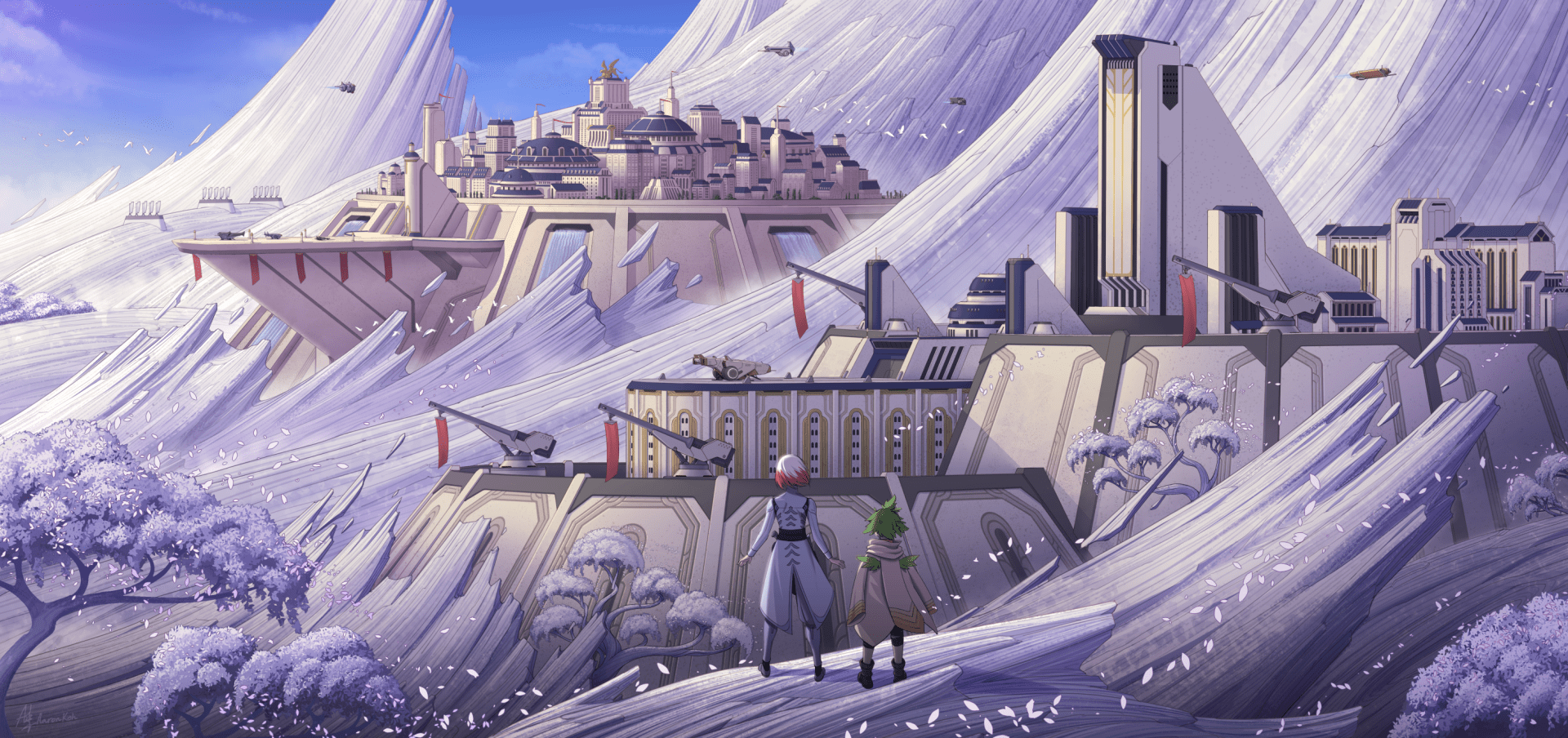
Leave a comment
Log in with itch.io to leave a comment.